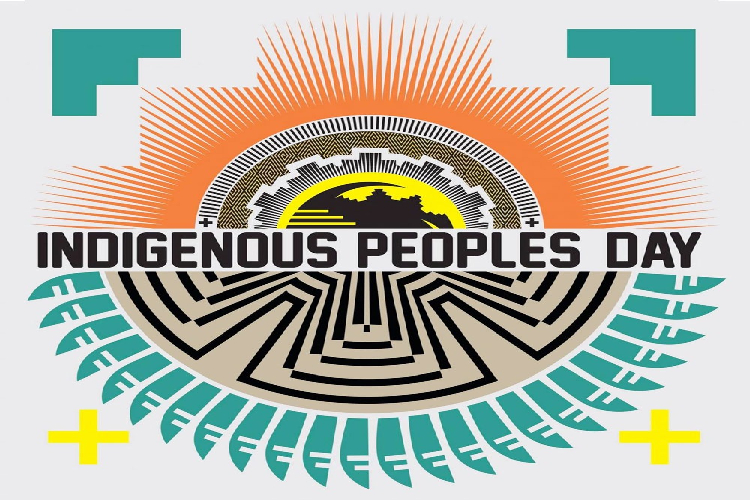
Columbus Day is being redefined as Indigenous People's Day. graphic courtesy of Non-Profit Quarterly
A culture of people, robbed of their rights.
On October 12, we celebrate Columbus Day to commemorate the discovery of the United States. The reality is that 100 million Indigenous people had already called America their home since the beginning of time. Christopher Columbus’s expeditions lead to colonization and genocide of the Indigenous people inhabiting their “discovered” land. As a society, we have shown pride in the discovery of the New World but have ignored the treatment towards Indigenous people.
The federal holiday of Columbus Day was started in 1937 to honor the Italian-American community. The first day of honor was October 12th, 1792 in New York. Later, in 1937, President Roosevelt announced Columbus Day as a national holiday even though the explorer supposedly never set foot in the North American mainland. The four trips started in 1492 and landed him on the Caribbean islands, which are now the Bahamas and the island Hispaniola. He explored the Central and South American coasts, but he was given credit for his North American discoveries. The true history of Columbus Day was covered up, as the man who has been given credit initiated years of mistreatment towards Indigenous people. The Washington Post stated, “Columbus was a brutal viceroy and governor of the Caribbean islands on which he did land.” There are now records that the explorer terrorized Spanish colonies, as well as committing atrocities against native people and destroying their populations. Columbus sought to convert native people to Christianity against their wishes. Catholic figures, including Pope Leo XIII, were in full support of spreading the wishes of God. The harmful actions towards Native Americans have been ignored in history; instead, Indigenous people have been painted as savages. Columbus’s invasion led to an increase in deaths among Native Americans. These deaths were caused by an epidemic from the colonizers, because they were yet to be exposed to the foreign disease. The introduction of Columbus and his treatment toward Indigenous people created many deaths and ongoing distrust between different racial groups.
Indigenous people face poverty, landlessness, malnutrition, and internal displacement daily. Twenty-five percent of Indigenous people live in poverty, and women are more likely to be poorer because they have fewer job opportunities. These families are lacking income and resources to provide a stable life. Indigenous people are seen to suffer from social discrimination. These inequalities can be attributed to the lack of Native American representation in decision making. An example of the exclusion in decision making is the lack of accessibility for Indigenous people in voting. The American Bar Association shared a personal story of a Navajo grandmother who was not able to vote in Arizona after they passed the voter ID law in 2004. The woman grew up on a reservation in Hogan, Arizona, and lived a modest life. She was unable to vote because at boarding school they changed her Navajo name to an English one. Her name change resulted in a struggle for the woman to be able to vote in her native state, but with persistence, the woman was given her right to vote. Indigenous people have to fight against the government for their basic rights and freedoms. They are fighting to change the 500 years of wrongdoings against Indigenous people in the court system. They continue to have to fight for the rights that most Americans are given even though they are the natives. The rights for Native Americans on reservations are even more restricted, and their struggles have been ignored in history and modern times.
On reservations, young Native Americans are taking their lives three to ten times more than the national average. “American Indian/Alaska Natives (AI/AN) have the highest rates of suicide of any racial/ethnic group in the United States,” quoted the Centers for Disease Control and Prevention. Among these communities, there are also higher rates of poverty, unemployment, sexual assault, domestic violence, and drug addiction. One-fourth of Native American children grow up in poverty, compared to 13% in the United States. Indigenous children on reservations graduate high school at a rate of 17% lower than the national average of 85%. The substance abuse of teenagers and parents results in lower opportunities and expectations for their lives, along with shorter expected life spans. Native Americans on reservations are twice as likely to die before reaching 24 years of age. The abuse, neglect, and post-traumatic stress disorder rates for Native Americans are equal to the rates of veterans that have returned from Afghanistan. Native Americans living on reservations face the same and even harder struggles around voting than those who don’t live on reservations. The Indian Citizenship of 1924 gave all Native Americans born in the U.S. the right to vote. The law was state governed and some states banned Native Americans from voting. The Indigenous individuals living on reservations have continued to be excluded from the democratic process even after the enactment of The Indian Citizenship of 1924. The United States is slowly becoming more aware of the disadvantages that Indigenous people have, especially on reservations.
Fortunately, history is starting to be uncovered. In 1992, in Berkeley, California on the 500th anniversary of the arrival of Christopher Columbus, the name was changed to Indigenous Peoples’ Day. Currently, 14 states celebrate the new holiday name of Indigenous Peoples’ Day. Our society is beginning to fight and publicize the need to change Columbus Day to Indigenous People’s Day. The United States has started to understand the mistreatment that Indigenous people and those living on reservations face in their everyday lives. Citizens want to work with Native Americans to help them get the rights and treatment they deserve. Changing our national holiday name would be a step forward as a nation in supporting equal rights for all and the acknowledgment of Indigenous people.